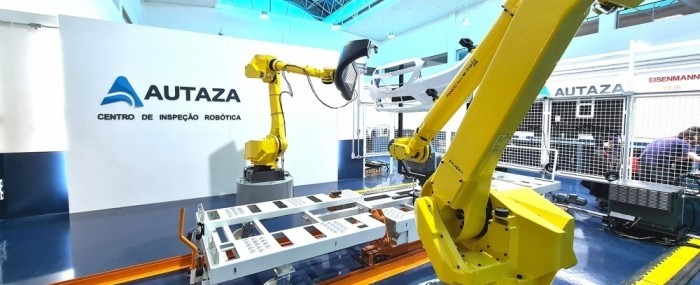
Startup supported by FAPESP launches Robotic Inspection Center
09 de fevereiro de 2021By Elton Alisson | FAPESP Innovative R&D – Autaza, a Brazilian startup specializing in computer vision (CV) and artificial intelligence (AI) for industrial quality inspection, has installed a Robotic Inspection Center (RIC) in São José dos Campos, in the state of São Paulo.
Located in an area of 130 square meters in São José dos Campos Technology Park, the RIC is equipped with robots and automation systems that simulate the complexity and mobility of an automotive production line.
According to Enivaldo Amaral, Autaza’s director of engineering, the RIC is the only facility of its kind in Brazil with an optical system for automotive paint quality inspection using CV and AI.
The system automatically identifies appearance defects in parts made of plastic, metal, and composites (combinations of raw materials) with the aim of enhancing production efficiency.
“We set up a real-scale automotive paint quality inspection cell in the RIC to demonstrate to prospective customers exactly how the system we’ve developed performs on an automotive production line,” Amaral told Innovative R&D.
Investment in the RIC has reached BRL 1.5 million, with funding via projects supported by FAPESP’s Innovative Research in Small Business Program (PIPE) and FINEP, the Brazilian Innovation Agency, an arm of the federal government. It is also supported by Igus, a German manufacturer of bearings and cables, and Eisenmann, a multinational supplier of finishing, automation, and paint systems that has assembled an automotive production line in the RIC.
“The RIC also provides automotive paint quality inspection services to manufacturers of these products, who can send us a car body or separate parts for us to inspect and issue a report,” Amaral said.
Multiple applications
In 2017 Autaza won funding from PIPE-FAPESP for a project to develop an automated car body quality inspection system. The startup expanded its offering to cover glass and aircraft manufacturers, and in 2019 opened an office in Ann Arbor, Michigan (USA), to publicize its brand, prospect for global customers in all three industries, and identify new markets (read more at: pesquisaparainovacao.fapesp.br/865 and pesquisaparainovacao.fapesp.br/958).
“Our solutions were originally developed to meet demand from the automotive, aircraft, and glass industries, but they can be used in several other segments,” Amaral said.
In partnership with the Franco-American ESI Group, a provider of virtual prototyping solutions, Autaza developed software that analyzes data to predict whether a part will have defects and how severe they will be even before it is produced.
“ESI is one of the companies with which we developed customized solutions. We’ve also conducted projects in partnership with BASF and L’Oréal,” Amaral said.
The startup began as a research and development project that brought together General Motors (GM) in metropolitan São Paulo and the Aeronautical Technology Institute (ITA) in São José dos Campos, resulting in a functional prototype of the CV-AI system to detect car body surface defects. The new technology is an alternative to the visual inspection method currently used by many automotive manufacturers, who have to train inspectors to identify and classify defects.
Positive results from the automated inspection system and GM’s willingness to permit the use of intellectual property rights to the new system motivated the three researchers responsible for the project at ITA to found the startup and bring the technology to market.
GM Brazil tested the technology and authorized the use of IP rights, leading to the founding of Autaza. It also implemented the system in the US and at the German plant where it produced the Opel until 2017. The German unit was later sold to Peugeot and BNP Paribas. The technology is also used by Volkswagen.
The same smart inspection technology is used to detect flaws in the coating of composite materials used by aircraft manufacturers, opening up another market for the firm and bringing customers as large as Embraer.
In the glass industry, the technology is used to grade the quality of sheet glass used in residential and commercial building windows and the glass used in bottles and in flasks for nail varnish, for example.
The software developed by Autaza classifies the quality of glass produced in the factory. If the software indicates the need for changes, the glass maker’s process engineers can rapidly make the necessary adjustments to production line parameters, such as speed, temperature, and raw material composition.
The solution is used by Cebrace, a leading producer of float glass in Brazil. “By using our system, glass makers can fine-tune their production line parameters and processes to meet the required standards,” Amaral said.
Lasting partnership
The story of Autaza began in the incubation program of Nexus, the São José Technology Park’s innovation hub. The startup graduated in 2018 but is still based in the facility.
The RIC is connected to the facility’s Internet of Things Testbed Virtual Platform so that the robots’ energy consumption can be measured.
The partnership between Autaza and the São José Technology Park covers workforce training and qualification as well as project development. Every six months the firm offers two paid internships for students at universities accredited by the facility.
“It’s a new functional space for technology creation and personnel development. It also acts as a showroom to educate the public about industry 4.0,” Amaral said.
